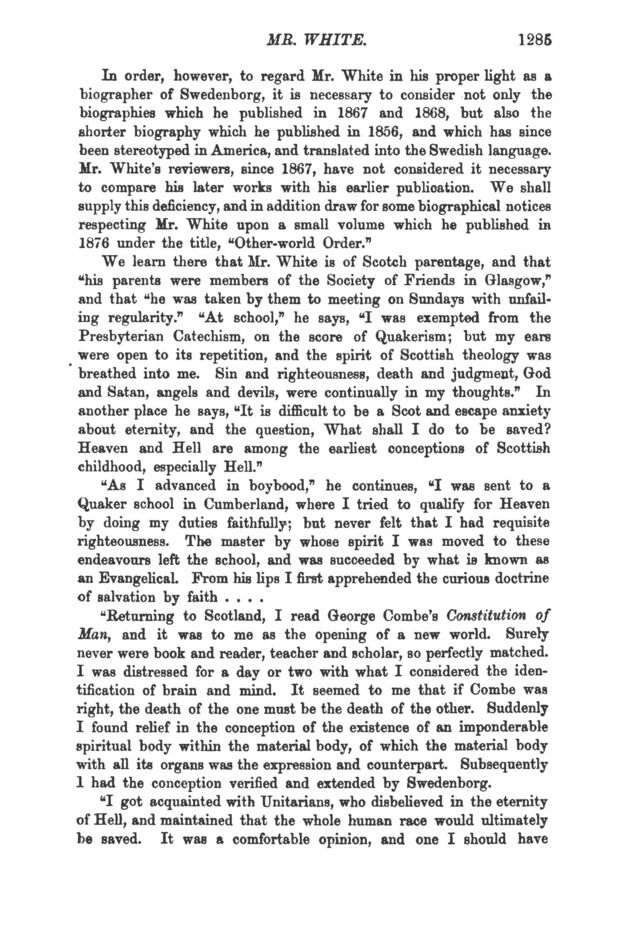
Full resolution (JPEG) - On this page / på denna sida - Sidor ...

<< prev. page << föreg. sida << >> nästa sida >> next page >>
Below is the raw OCR text
from the above scanned image.
Do you see an error? Proofread the page now!
Här nedan syns maskintolkade texten från faksimilbilden ovan.
Ser du något fel? Korrekturläs sidan nu!
This page has never been proofread. / Denna sida har aldrig korrekturlästs.
MR. WHITE. 1285
In order, however, to regard Mr. White in his proper light as a
biographer of Swedenborg, it is necessary to consider not only the
biographies which he published in 1867 and 1868, but also the
shorter biography which he published in 1856, and which has since
been stereotyped in America, and translated into the Swedish language.
Mr. White’s reviewers, since 1867, have not considered it necessary
to compare his later works with his earlier publication. We shall
supply this deficiency, and in addition drawfor some biographical notices
respecting Mr. White upon a small volume which he published in
1876 under the title, "Other-world Order."
We learn there that Mr. White is of Scotch parentage, and that
"his parents were members of the Society of Friends in Glasgow,"
and that "he was taken by them to meeting on Sundays with unfail
ing regularity." "At school," he says, "I was exempted from the
Presbyterian Catechism, on the score of Quakerism; but my ears
were open to its repetition, and the spirit of Scottish theology was
breathed into me. Sin and righteousness, death and judgment, God
and Satan, angels and devils, were continually in my thoughts." In
another place he says, "It is difficult to be a Scot and escape anxiety
about eternity, and the question, What shall I do to be saved?
Heaven and Hell are among the earliest conceptions of Scottish
childhood, especially Hell.”
"As I advanced in boybood," he continues, "I was sent to a
Quaker school in Cumberland, where I tried to qualify for Heaven
by doing my duties faithfully; but never felt that I had requisite
righteousness. The master by whose spirit I was moved to these
endeavours left the school, and was succeeded by what is known as
an Evangelical. From his lips I first apprehended the curious doctrine
of salvation by faith . . . .
"Returning to Scotland, I read George Combe’s Constitution of
Man, and it was to me as the opening of a new world. Surely
never were book and reader, teacher and scholar, so perfectly matched.
I was distressed for a day or two with what I considered the iden
tification of brain and mind. It seemed to me that if Combe was
right, the death of the one must be the death of the other. Suddenly
I found relief in the conception of the existence of an imponderable
spiritual body within the material body, of which the material body
with all its organs was the expression and counterpart. Subsequently
I had the conception verified and extended by Swedenborg.
"I got acquainted with Unitarians, who disbelieved in the eternity
of Hell, and maintained that the whole human race would ultimately
be saved. It was a comfortable opinion, and one I should have
<< prev. page << föreg. sida << >> nästa sida >> next page >>